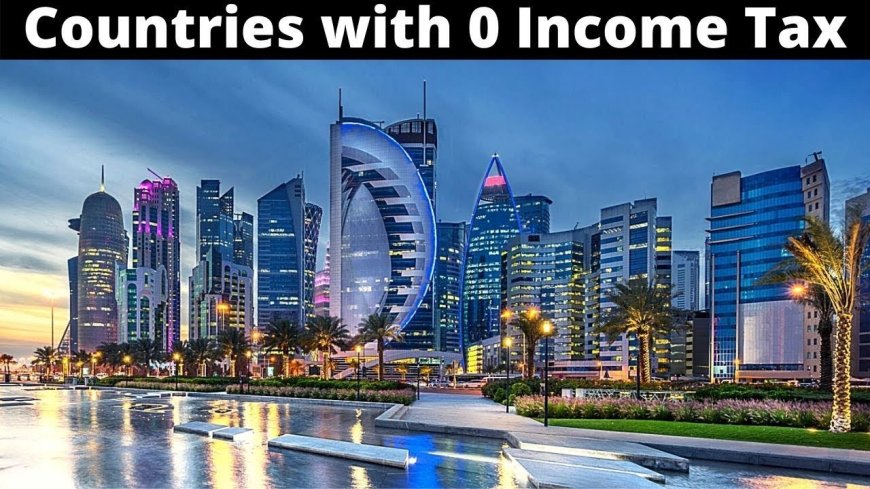Could a 0% Income Tax Policy Transform India's Economy?
This article explores the potential of a 0% income tax policy in India, examining the economic benefits, challenges, global comparisons, and practical implications for sustainable growth, social equity, and investment. Find out how such a policy could reshape India's economic landscape and what alternative revenue strategies might make it feasible.

The idea of abolishing income tax in India has been a topic of interest, with proponents suggesting it could unlock unprecedented economic growth, drive investments, and elevate the country as a global investment hub. This radical policy shift would, however, bring significant challenges, especially regarding government revenue replacement. Let’s explore whether a 0% income tax policy could work in India, weighing its potential benefits, risks, and necessary fiscal strategies.
Understanding the 0% Income Tax Policy Concept

A 0% income tax policy proposes to eliminate personal income tax entirely, allowing citizens to retain all their earnings without government deductions. Economists supporting this concept argue it could stimulate spending, boost consumer demand, and increase savings and investments, leading to accelerated economic growth. Countries like the UAE and Qatar have successfully implemented versions of this policy, relying on alternative revenue sources instead of income tax to sustain government finances.
Potential Benefits of a 0% Income Tax Policy in India

-
Increased Consumer Spending and Economic Growth:
With more disposable income, consumer spending would likely surge. Increased demand could boost business growth, production, and innovation, creating jobs and driving GDP growth. Enhanced purchasing power among citizens would support sectors like retail, real estate, and manufacturing, stimulating economic activity across the board -
Attraction for Foreign Investment:
A tax-free income environment could make India an attractive destination for foreign investors, particularly in industries like technology, manufacturing, and service sectors. Such a move might position India as a more competitive market within Asia, potentially rivalling economies like Singapore and Hong Kong, which have favorable tax policies -
Higher Household Savings and Capital for Investment:
Without income tax, household savings rates could increase. Higher savings could lead to more capital available for investments in infrastructure, startups, and small to medium enterprises (SMEs). This could support broader wealth generation and uplift micro-economies within India’s rural and urban areas
Challenges of a 0% Income Tax Policy
-
Revenue Replacement and Budget Deficit Risks:
Income tax is a substantial source of government revenue in India, accounting for around 15% of the total. Eliminating it would create a significant budget gap. Finding alternative revenue sources would be essential to prevent deficits and ensure the government can continue funding social programs, healthcare, defense, and infrastructure projects -
Potential for Widening Economic Inequality:
A 0% income tax policy could disproportionately benefit high-income individuals, potentially exacerbating wealth inequality. Without a progressive tax structure, the wealthiest citizens might accumulate far more capital than the middle and lower-income groups. Addressing this issue would require policies that redistribute wealth equitably and provide support for disadvantaged communities -
Inflationary Pressures:
Increased disposable income might spur higher consumer demand, but if supply cannot match this demand, it could lead to inflation. Managing inflationary pressures would be essential to avoid diminishing the real value of income gains from a tax-free policy.
Alternatives to Income Tax for Revenue Generation
To offset the loss of income tax revenue, India could explore several alternative funding options:
-
Indirect Taxes:
Expanding indirect taxes such as the Goods and Services Tax (GST) could help cover revenue losses. However, a balanced approach would be necessary to prevent these taxes from disproportionately impacting lower-income households. -
Auctioning Natural Resources and Government Assets:
India has already generated significant revenue from telecom spectrum auctions and could expand such practices to sectors like mining and infrastructure. Asset monetization could become a reliable revenue source if managed transparently and sustainably -
Enhanced Public-Private Partnerships (PPP):
Encouraging PPPs in sectors like infrastructure, education, and healthcare could share the burden of financing large-scale projects. With proper management, PPPs could improve service delivery while reducing government expenditure.
Case Study: How Do Tax-Free Economies Sustain?
Some countries, particularly in the Middle East, have achieved sustainable growth without personal income tax. For instance:
- UAE: The UAE funds its government primarily through oil revenue and value-added taxes (VAT). A 5% VAT has successfully supplemented income while keeping the cost of living manageable.
- Qatar: Another example is Qatar, which relies on its vast natural gas reserves and maintains a tax-free income policy for individuals. The government raises revenue through VAT and strategic investments in global markets.
India lacks similar natural resources; thus, the Indian government would need to develop a unique model, focusing on diverse revenue sources and policies that support sustainable economic growth.
Long-Term Economic Implications of a 0% Income Tax Policy

Adopting a 0% income tax policy in India would require careful consideration of long-term impacts on the country's economic landscape. Potential outcomes include:
- A Thriving Middle Class: Increased disposable income could empower India’s middle class, driving demand for quality housing, education, and healthcare, thereby strengthening social mobility.
- Encouragement for Entrepreneurship: With no income tax burdens, more individuals may invest in new businesses, stimulating innovation and economic diversification.
- Shifts in Consumption Patterns: Reduced taxes on personal income may lead to shifts in consumer behavior, with more spending on luxury goods, travel, and other discretionary areas.
Conclusion
The concept of a 0% income tax policy for India presents both exciting possibilities and complex challenges. While it has the potential to boost consumer spending, attract foreign investment, and increase household savings, the policy also risks widening economic inequality and creating revenue gaps. To make such a shift feasible, the government would need a well-designed plan to replace income tax revenue, possibly through indirect taxes, asset monetization, and other innovative revenue streams. India could learn from international tax-free economies but must adapt these models to fit its unique socio-economic landscape.
FAQs
Q: Is it possible for India to implement a 0% income tax policy?
A: While theoretically feasible, a 0% income tax policy would require extensive financial planning and alternative revenue strategies to ensure sustainable government funding.
Q: Would eliminating income tax increase foreign investment in India?
A: Yes, removing income tax could make India a more attractive destination for foreign investors, particularly in industries where operational costs are a key consideration.
Q: How would the government make up for the revenue loss from income tax?
A: The government could explore options like increasing indirect taxes, auctioning natural resources, expanding PPPs, and boosting exports to offset the revenue loss.
Q: Could a 0% income tax policy lead to inflation?
A: Yes, increased disposable income could spur demand and potentially lead to inflation if supply does not keep up.
What's Your Reaction?


















































